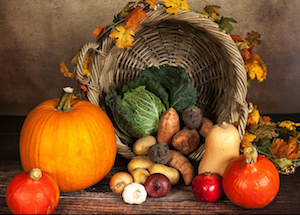This, of course is Thanksgiving Day in the US, so I thought it might be opportune to write a few words about gratitude. In the year that we have had, it is more important than ever to make a list of the things we are grateful for, starting perhaps with feeling grateful that we are still standing and coming out of lockdown next Wednesday! But all joking aside, are there things that you are grateful for this year? Did you find you had more time to devote to things you were really interested in? Did you appreciate the importance of friends and family more? Did you develop more appreciation for nature and the changing seasons through all the walks we took?
I know I have never appreciated autumn more, been more aware of the changing colours, the pink and orange skies with the low setting sun, the mildness of our Irish climate, the joy of meeting friends for walks. During the last lockdown, it was enjoying my garden, meditating on my patio listening to the water feature beside my Buddha, underneath the beautiful rose trellis-and being grateful to my friends and family who had gifted me these things, or worked to install them.
Robert Emmons is one of the pioneers who studied the effects that expressing gratitude has. He found that keeping and updating a gratitude journal had benefits for both physical and mental health, compared to people who wrote about hassles and negative things, and a third group who wrote about neutral things (Emmons and Mc Cullough 2003). In a more recent study (2017), Wong and Brown found that those who wrote a gratitude letter weekly for three weeks, had significantly better mental health, up to three months later, than either people who didn’t write about anything, or who wrote about negative experiences. And this is without even delivering the letter to the person you are grateful to!
Neuroscientists investigating what happens in the brain, discovered that when we give or receive gratitude, dopamine, that most rewarding of feel-good chemicals is released in our brain, which no doubt accounts for the increased optimism, resilience and mechanisms for coping with stress that people who express gratitude show.
Another scientist, Sarah Algoe has investigated the effect that sharing gratitude has on our relationships with others. Not surprisingly, she found that expressing gratitude increased the strength of a relationship. She differentiated between what she called “high quality” expressions of gratitude and appreciation and “low quality”. Basically, “high quality” expressions were when the recipient expressed appreciation of some quality of the giver, how thoughtful they were, how much they went out of their way to help them or choose the right gift, compared to “low quality” expressions, which were more focused on the gift itself – that’s a brilliant guitar, phone, scarf etc. The after-glow of the high quality expressions lasted much longer and seemed to cement people together.
So as we approach the season of giving and receiving, you can have the opportunity to try out this scientific discovery!

